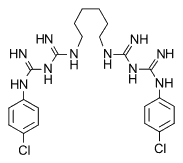* Using chlorhexidine gluconate oral rinse in patients undergoing heart surgery significantly reduces the rate of nosocomial pneumonia in patients intubated for more than 24 hours, according to a study involving 561 patients.
Researchers compared the effectiveness of the chlorhexidine rinse to that of a Listerine (phenolic mixture) rinse. Patients used their assigned rinse preoperatively and twice daily postoperatively for 10 days or until extubation, tracheostomy, death, or diagnosis of pneumonia.
Overall, the rate of nosocomial pneumonia in the chlorhexidine group was 52% lower than in the Listerine group. In patients intubated for more than 24 hours, however, the reduction was more significant-58% for patients rinsing with chlorhexidine.
The researchers call for a larger study to confirm results, but note the cost of routinely using chlorhexidine gluconate oral rinse in cardiac surgery patients is less than 10% of the cost of a single case of nosocomial pneumonia.
Source: Houston, S., et al.: "Effectiveness of 0.12% Chlorhexidine Gluconate Oral Rinse in Reducing Prevalence of Nosocomial Pneumonia in Patients Undergoing Heart Surgery," American Journal of Critical Care, November 2002.
Copyright Springhouse Corporation Feb 2003
Provided by ProQuest Information and Learning Company. All rights Reserved



